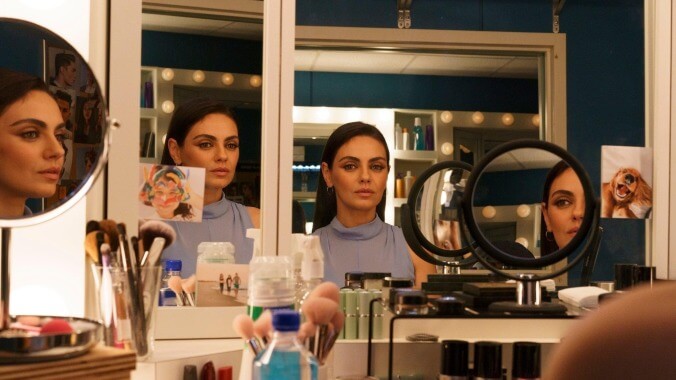In Luckiest Girl Alive, a young woman's present forces her to revisit the past
Despite the undeniable power of Jessica Knoll's semi-autobiographical story, its translation to film needs more cinematic structure

How does one go about critiquing a movie that offers some really good insights, but doesn’t necessarily hold together in other ways? In the case of Luckiest Girl Alive, its points about rape and privilege are both dead-on and extremely personal to screenwriter Jessica Knoll, here adapting her own novel—one she initially claimed was fiction, but eventually admitted was based on true events that happened to her.
The structure of those events, however, remains better suited to a novel than a movie, as two timelines play out simultaneously in a voiceover-heavy story mostly told from inside the protagonist’s head. Scenes of assault and subsequent gaslighting—by family and society—exude a raw urgency that viscerally conveys the inner rage Knoll’s onscreen alter-ego Ani (played by Mila Kunis and Chiara Aurelia, at different ages) must constantly hold back. But there’s a lot more movie than that, and not all of it works as well as those few extremely powerful moments.
The year is 2015, as indicated by a “Hillary Clinton For President” street sign, itself an ominous reminder of the cultural backslide to come. “I’m not getting married until we have a woman for president,” says Ani’s best friend in response to the latter’s impending nuptials to a perfect, old-money inheriting lacrosse champion named Luke (Finn Wittrock). Ani, previously known as Tifani, has constructed what she considers to be the perfect image of a successful life around her, though she makes nowhere near the income she implies, even as a top women’s magazine editor-columnist penning cover stories like “When Your Rape Costs More Than Your Rent.”
Ani’s faux-perfection is a reaction to surviving a mass-shooting at her private high school, after which her fellow, David Hogg-like survivor-turned-anti-gun advocate Dean Barton (Alex Barone) accused her of conspiring with the killer. But even though Ani’s near-constant voiceover reveals much of what she thinks, even an inner monologue doesn’t disclose what really happened. Flashes of bloody knives in her hands suggest something terrible—and it’s not the misbegotten American Psycho sequel Kunis starred in circa 2002.
When a documentary filmmaker seeks out her side of the story, baiting her with the indication that Dean is going to speak on the record as well, the second timeline begins to unfold. Rewinding the clock to her high school years, shortly before the massacre, younger Tifani’s story sets up a mystery: Who among these teens is the shooter, and is Tifani in any way also culpable? Adult Ani prides herself on saying what people want to hear, and otherwise being a closed book. But flashbacks don’t lie.
The story subsequently takes up an intriguing writing challenge: what does it take to make a school shooter sympathetic? The obvious answer becomes “the victims were unapologetic rapists and chronic abusers, never brought to justice.” As an intellectual exercise, it’s an interesting inversion of expectations–what if David Hogg were a bad guy, and the shooters, if not quite “good,” were justified in their actions—at least in the way fiction frequently validates vengeance? Meanwhile, as a depiction of reality, the film is more convincing in its portrayal of sexual assault, perhaps because it actually happened to the author.
Aurelia, who previously played a younger Carla Gugino in Gerald’s Game, is the real star here, acting out the inner trauma Ani has tried to forget. Watching classmates—and her perpetually drunk mom (Connie Britton)—blame her as the victim, insisting on maintaining appearances, is enough to make any viewer’s teeth clench, especially those who’ve experienced assault (directly or not). The movie effectively lets you know that this is a sensation many women feel and cannot express aloud every single day.
Because her narration never especially enlightens in the way that the flashbacks do, Kunis proves inherently less interesting playing the “masked” adult version of Ani. But between the film’s parallel narratives, Luckiest Girl Alive concludes with almost as many endings as The Lord Of The Rings: The Return Of The King, at least in part because Knoll adds a major autobiographical moment that feels more personally therapeutic than dramatically essential. As clearly important as it was to capture her experience onscreen, a cowriter with more experience adapting (and paring down) novels could shaped this into something more cohesive.
As a book, Luckiest Girl Alive was frequently compared to Gone Girl. The same isn’t likely to happen with the movie version, evidencing the difference a strong adaptation and director can make. David Fincher has a vision; Mike Barker, who often works in TV, lacks the firm hand needed to weave Knoll’s threads into a single, compelling tapestry.
In a weird quirk of timing, this marks the second movie this week featuring Scoot McNairy as a kindly teacher, the other being Lyle, Lyle, Crocodile. He seems to have found a solid niche, playing one of the only responsible adult males. If not his, then the unquestionably well-intentioned and obviously deeply personal Luckiest Girl Alive would benefit from more mature guidance.